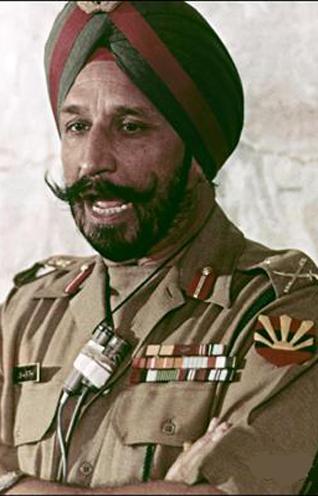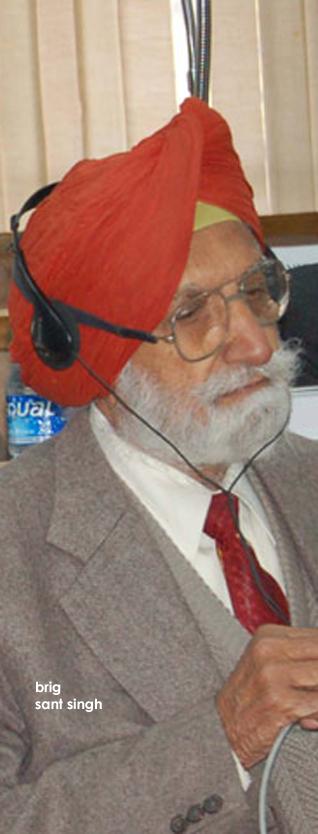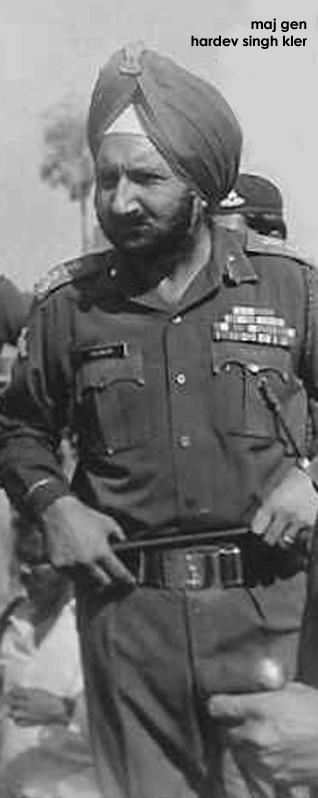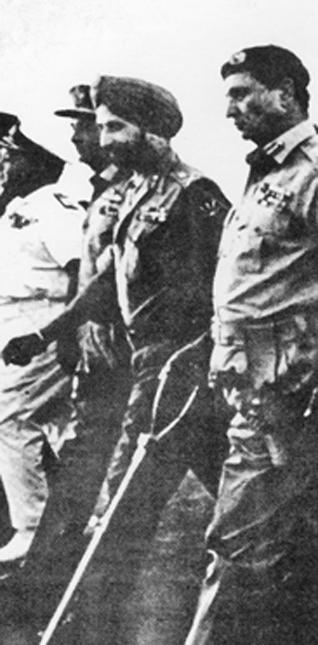History
How India's Sikh Troops Liberated Bangla Desh
by VIJAY MOHAN
December 16, 2011 marks the 40th Anniversary of the liberation of Bangla Desh.
War is one of the defining factors that chart the course of history and leaves in its wake some decisive moments that have an everlasting impact on the psyche of the embattled nations as well as individuals who are part of it.
The 1971 Indo-Pakistani war was no different and its outcome had huge ramifications on the future of South Asia, as a new nation arose from the shattered remnants of a routed army.
The war was fought on the eastern as well as the western front and for the Indian Army - with mostly Sikh soldiers on the front-lines in each case - there were several momentous occasions, the most notable being presiding over the largest surrender of troops in the history of warfare and detaining the enemy’s top commander in the east, Lt. Gen. A.A.K. Niazi ... by General Jagjit Singh Aurora, The Liberator of Bangla Desh.
Maj Gen Jamshed Khan, GOC 36 Ad Hoc Division, which was responsible for the defence of Dacca (then capital of East Pakistan, now Bangla Desh), drove over with a white flag. He was stripped of his official flag, weapon and badges of rank, recalled the commander of FJ Force, Brig. Sant Singh.
Pakistani officers were destroying maps and documents. A few minutes later, Niazi, wearing a holstered pistol, came out from an underground bunker to his plush office now occupied by the Indians. He was silent and looked sad and anxious, recalled Brig. Sant Singh, who, prior to Independence, had served in the same regiment, which Niazi later commanded.
The brilliant operation was directed hands-on by Major General Hardev Singh Kler.
FJ Force, comprising 13 Guards, 2 Para and 6 Bihar had rapidly advanced along the Mymensingh-Madhupur axis, securing the area and covering around 55 km before reaching Bhuri Ganga on the outskirts of Dacca.
“Time was of the essence and the fall of Mymensingh was among the decisive points of the war in the east” said Brig. Sant Singh, who was decorated with the Maha Vir Chakra for his heroic leadership.
On the western frontier, the Battle of Longewala become the most notable operation. Fought on December 5-6, 1971 at the remote border outpost in the Jaisalmer sector, it was one of the first major engagements between India and Pakistan in the west. Touted as one of the biggest routs for Pakistan in this theatre, it goes down in the history of warfare as a classic example of human resolve and motivation in the face of extremely heavy odds, where an infantry company of about just 70 men
from 23 Punjab held back an assaulting enemy brigade of over 2,800 troops supported by 65 tanks.
“We were given a choice. To stay put and defend the position or go in for a tactical retreat,” recalls Brig. (then Major) Kuldip Singh Chandpuri, who was commanding the company and was later also decorated with the Maha Vir Chakra. The first attack by Pakistani troops at night was stalled through anti-tank weapons. Reserve fuel drums kept atop tanks were exploded, throwing enough light for our gunners positioned on high ground, while their own smoke blinded their troops.
“Though we were outnumbered and surrounded, Pakistani infantry was unable to advance. We held them till dawn when the IAF came in,” he added. When the operation ended, 22 Pakistani tanks had been destroyed.
[Courtesy: Tribune. Edited for sikhchic.com]
December 16, 2011
Conversation about this article
1: Isher Singh (Bhubaneswar, Orissa, India), December 16, 2011, 12:10 PM.
Has India ever done anything really meaningful in the last century, without the involvement and assistance of Sikhs ...
2: Singh (U.S.A.), December 16, 2011, 12:42 PM.
Time to Liberate ourselves from the clutches of hollow Indian rituals and slavery of thought.
3: Ari Singh (Sofia, Bulgaria), December 16, 2011, 12:46 PM.
This is indeed an extremely interesting article. Formation of the the Khalsa by Guru Gobind Singh is the best thing that happened to the subcontinent. The Sikhs have recovered the wounded civilization of India, which had been raped by foreign armies for centuries. Sikhs have substantially influenced the independence struggles in India, Kenya, Malaysia, Ladakh,and Bangla Desh. The contribution of Sikhs in WWI and II, despite their numbers, is greater than any other community.
4: Bibek Singh (Jersey City, New Jersey, U.S.A.), December 16, 2011, 1:48 PM.
"Border", a 1997 Bollywood film, shows the the Battle of Longewala, with Major Chandpuri being portrayed by Bollywood actor Sunny Deol. In the first few scenes, the Major's wife (played by Tabu) is shown trying to influence her father for the Major's transfer. This, as she believes, will avoid his participation in the battle and will ensure his safety. However, when the Major accidentally learns about this plan, he leaves his wife and heads into battle. Such was the commitment and the Khalsa Spirit displayed by our heroes. Is the same spirit still alive? Do our leaders ever bother to honour such jewels of our community?
5: Baldev Singh (Bradford, United Kingdom), December 16, 2011, 2:13 PM.
It is time we liberated Punjab ...
6: R. Singh (Canada), December 16, 2011, 2:47 PM.
Yet Sikh soldiers did not escape the vicious pogroms directed at Sikhs in general, merely 13 years later, in 1984! Those serving in the armed forces were disarmed before the pogrom began. How does one feel about liberating others while being rendered helpless in helping oneself?
7: Sandeep Singh (Jaipur, Rajasthan, India), December 16, 2011, 3:27 PM.
I'm a Sikh ... and feel immense love for my Sikh nation. Thank you for this most interesting article ... reading it, I feel all the more proud of my people.
8: Khalsa Lakhvir Singh (Nairobi, Kenya), December 16, 2011, 5:07 PM.
Makhan Singh, a nationalist who fought for independence for both India and Kenya, was a staunch and unwavering trade unionist who was held in detention for 11 years by the British in Kenya (he was the first person to publicly demand independence for Kenya) - the longest time served by freedom fighter, including the leader of the resistance, who later became Kenya's first President - Mzee Jomo Kenyatta. Makhan Singh, however, got nothing out of his struggle after independence for he refused to beg for leadership roles that were being dished out by the President to those who had played a significant role in the independence struggle.
9: Gurjender Singh (Maryland, U.S.A.), December 16, 2011, 5:23 PM.
I cannot forget the day when, after the liberation of Bangla Desh, Gen. Jagjit Singh came to the army city of Meerut, India. All roads and shopping centers were full of people who came to see the procession in his honor. All roads were decorated with flower gates. I have not seen that warm a reception for any other person or leader in Meerut. It was most unfortunate that he was not awarded or decorated to the level his accomplishments deserved.
10: Kanwarjeet Singh (Franklin Park, New Jersey, U.S.A.), December 16, 2011, 6:57 PM.
What war did the Sikhs not save India's sorry ass in? Guru Gobind Singh saved them from the Mughals. In the Anglo-Sikh wars, when the rest of the subcontinent ganged up on the Sikhs - the British would have been slaughtered if not for the Hindu kingdoms collectively having supported them against the Sikhs. 90%+ of the freedom fighters in India, including the Andaman and Nicobar exiles were Sikh. Sikhs saved Kashmir from falling into Pakistan's hands right after partition - Sikh regiments were parachuted into Kashmir when the pathans attacked Kashmir. The Sikh regiments bore the brunt of the 1962 war against China when Nehru and his corrupt uncle, Gen. Kaul, sent hay instead of arms and ammunition. The 1965 war with Pakistan - Sikh regiments spear-headed multiple attacks on the western sector, not only saving India from a well armed Pakistan army but also saving millions of acres of land in Rajasthan that could have simply fallen into enemy hands. The 1971 war - Sikh troops liberated Bangladesh and kicked the Pakistan army in their teeth. The Sri Lanka conflict - Rajiv Gandhi sent the entire Sikh army to fight LTTE while himself supplying arms to LTTE. The Kargil conflict - Sikh regiments were at the forefront of the conflict and saved the day. Inspite of all of this, Sikhs have yet to be recognized in India's constitution; they still do not have equal rights with other faith groups or ethnicities. There has been no major war in the past four decades and India has turned her attention in the meantime to diluting and wiping out Sikhi. Most Sikhs have either left India or given up taking armed forces as a career. We now have officers being promoted to higher ranks based on their caste and who they know. This has set up a perfect situation for China and Pakistan to mess around. This time around India will not have the Sikhs to save their butts. I can almost picture the outcome: China and Pakistan at the borders, ready to invade and just like at Somnath with Abdali's forces, Indian priests will be busy saying prayers to their stone idols to make the enemy blind!
11: H.S. Vachoa ( U.S.A.), December 16, 2011, 8:31 PM.
This war was nothing but a war of Hinduism and Indira Gandhi against a Muslim country against which Sikhs were used. I'm not proud of Sikhs ignorantly fighting for the ideology of Hinduism, regardless of the victory. The Sikhs strengthened a demon in waiting.
12: N. Singh (Canada), December 16, 2011, 9:42 PM.
Kanwarjeet Singh ji: If it comes to this ... an Indo China war which I am confident is just a matter of time, it will be vital for the Sikhs to either a) negotiate for a Khalistan prior to supporting India, b) fight India whilst her forces are being exhausted on the Eastern front. We must be ready for such a circumstance and not fall prey to the false promises of 1965 when we were promised a 'Punjabi Suba' in exchange for defence of the country. If we do not learn from history, it will be a sad situation for us. The war with China is inevitable. Everyday, China is gaining more and more strength and this will play into the fear mentality of the U.S. and Western nations. Already they are propping up India and eventually they will set up the situation so that a war will occur between these two nations ... no matter, let's just be ready.
13: Raj (Canada), December 16, 2011, 10:34 PM.
Do not forget Gen. Subegh Singh who trained the Mukti Vahini in East Pakistan to fight as resistance fighters against the Pakistani army. He was the one who fortified Darbar Sahib and died defending it in 1984 against ... the Indian Army! As I was told by a retired Pakistani General, if Sikhs weren't fighting on the Indian side, the Pakistani army would have done a "shah vela", i.e., breakfast, of the Indians.
14: Bibek Singh (Jersey City/USA), December 16, 2011, 11:17 PM.
To the editor: Dear Sir/Madam, can you kindly share the contact details of Kanwarjeet Singh Ji? It seems that we live very close by. I would like to contact him for further discussion. Thanks in advance, Regards, Bibek Singh
15: N. Singh (Canada), December 16, 2011, 11:33 PM.
Raj ji: Thank You! I was going to post the same but for some reason didn't. He was a great man and highly decorated. For those of us who haven't fallen prey to Indian propaganda, we know and understand that he, along with the other shaheeds, made the ultimate sacrifice for Sikhi and the Sikhs.
16: G.C. Singh (U.S.A.), December 17, 2011, 12:30 AM.
Sikhs are very brave, writes Maj. Gen. Fazal Muqeem Khan, author of the book, 'Pakistan's Crisis of Leadership': "The major reason for our defeat are Sikhs. We are simply unable to do anything before them despite our best efforts. They are very daring people and are fond of martyrdom. They fight courageously and are capable of defeating an army much bigger than them. On December 3, 1971 we fiercely and vigorously attacked the Indian army with infantry brigade near Hussainiwala border. This brigade included Pakistan army's Punjab regiment together with the Baloch regiment. Within minutes we pushed the Indian army quite far back. Their defense posts fell under our control. The Indian army was retreating back very fast and the Pakistani army was going forward with great speed. Our army reached near Kausre-Hind post (Kasure). There was a small segment of the Indian army appointed to defend that post and their soldiers belonged to the Sikh Regiment. A few of the Sikh Regiment stopped our way forward like an iron wall. They greeted us with the ovation (Slogan) of 'Bole-so-Nihal' and attacked us like bloodthirsty, hungry lions and hawks. All these soldiers were Sikhs. There was even a dreadful hand-to-hand battle. The sky filled with roars of 'Yaa Ali' and 'Sat Sri Akal'. Even in this hand-to-hand fighting the Sikhs fought so bravely that all our desires, aspirations and dreams were shattered. In this war Lt. Col. Gulab Hussain was killed. With him Maj. Mohammed Zaeef and Capt. Arif Alim also died. It was difficult to count the number of soldiers who got killed. We were astonished to see the courage of those, handful of Sikh soldiers. When we seized possession of the three-story defense post of concrete, the Sikh soldiers went onto the roof and kept on persistently opposing us. The whole night they kept on showering fire on us and continued shouting the loud ovation of 'Sat Sri Akal'. These Sikh soldiers kept on the encounter till the next day. Next day the Pakistani tanks surrounded this post and bombed it with guns. Those handful of Sikhs got martyred in this encounter while resisting us, but other Sikh soldiers then destroyed our tanks with the help of their artillery. Fighting with great bravery they kept on marching forward and thus our army lost its foothold. Alas! A handful of Sikhs converted our great victory into a big defeat and shattered our confidence and courage. The same thing happened with us in Dhaka, Bangladesh. In the battle of Jassur, the Singhs opposed the Pakistan army so fiercely that our backbone and our foothold were lost. This became the main important reason of our defeat; and Sikhs' strength, safety and honour of the country became the sole cause of their victory." BUT what did Sikhs get in return for freeing India from centuries of slavery and in subsequent wars since 1947? Betrayal, treachery and slavery and brutal occupation. Even Gen. Aurora was humiliated while passing through Haryana during the 1982 Asian games. Gen. Subegh Singh who led the Mukti Vahini was falsely implicated in fabricated cases. It is time for Sikhs to free themselves from the Hindutava yoke and vow to restore effective levers of political, economic and military power in our own hands as a major force on the subcontinent.
17: Ravinder Singh (Mumbai, India), December 17, 2011, 3:58 AM.
The Sikh heroes of the Indian Army make all the Sikhs proud. There is no place in India where you will not find Sikhs. To advise the Sikhs of India to not fight for their motherland is like advising any citizen of any country to be against his own country. We Sikhs believe in the fatherhood of God and the brotherhood of mankind. As Sikhs whichever country we live in, we should just live by Sikhi principles. May Waheguru always guide the Sikh panth and keep the community in chardi kalaa.
18: R. Singh (Canada), December 17, 2011, 8:48 AM.
Ravinder Singh ji: Of course one loves one's homeland, but it is not incumbent on us to automatically love the very set up that degrades and oppresses us. Should not the country one belongs to treat all citizens of the country alike? Sikhi principles never condone expediency and opportunsim. Serving humanity, i.e., participating as equals is what a Sikh will do but for a Sikh to serve and participate in humiliation is not a very Sikh-like stance. Uncle Toms in positions of wealth and power, not acknowledging those fellow Sikhs who suffered and continue to suffer for no fault of theirs, are no role models. The widow colonies and orphans of 1984 still bear testimony to justice denied. Let us first recognize the heroes from the same army who got killed or languished and still languish in jails for possessing a moral conscience to stand up in the face of certain death.
19: H.S. Vachoa (U.S.A.), December 17, 2011, 2:22 PM.
Ravinder Singh ji: India is not a motherland. It is captured land created by the British - now misppropriated by caste-ridden Hindus. Why should Sikhs fight for a country that has been created over their own misery and subjugation?
20: Kanwarjeet Singh (Franklin Park, New Jersey, U.S.A.), December 18, 2011, 9:46 AM.
I was at a dinner yesterday and this topic of discussion came up. To my amazement most Sikhs there had no idea about the Sikh contributions in the armed forces. With this experience in mind, I am inclined to say that our rich history from the Gurus to 1947 was definitely completely lost with these individuals. What was really sad is that these are well educated, young Sikhs who are proud of their turbans and unshorn kesh. We are a brave community with a big heart and huge self esteem but the only things we lack are unity and leadership. It is important to remember that history is made by the writers and not reality / truth. Our history is taught to us by Government of India, right wing RSS/BJP who obviously have a 'wipe them out' agenda. So any history coming from India's textbooks either completely ignores Sikh contributions or manipulates them, showing Sikhs in a negative way. May I shed light on the matter of the BJP ruled states that had Guru Tegh Bahadar shown as a terrorist in the early 2000s, Bhagat Singh was indicated as a terrorist in these books too. Another falsehood is proclaimed by blindly linking Guru Gobind Singh to Goddess Chandi - thus trying to dilute out a distinct identity. No mention is made of important events such as Guru Tegh Bahadar's martyrdom, Guru Gobind Singh's battles, the fact that the Namdhari Sikhs were the first non-violent civil disobedience protestors in modern India - whose methods were copied by M.K. Gandhi and acknowledged by him in his early writings (with a complete U-turn, however, in later writings). Since we have weak leaders, we never challenge these distortions and this slowly and effectively filters into our younger generation. Another effective medium used by the right wing Arya Samaji and Hindu Punjabis is the medium of movies and TV. In the 80s/90s, every opportunity was taken to mock and ridicule Sikhs and their appearances in a subtle and effective way. This helped wipe out Sikh identity for most Sikhs who were loosely attached to Sikhi. In the 2000s this agenda has been slowly turned towards targeting other Sikhs. The way this is being done and to some effect is - making movies highlighting Sikh contributions and showing 'intelligent' Sikhs but this message is padded on with acts and beliefs inconsistent with Sikhi. For example: an intelligent Sikh is shown praying to the 'photo' of Guru Nanak, a turbaned Sikh is shown marrying a hindu girl in a gurdwara or vice versa, a turbaned devout Sikh is never ever shown praying to Guru Gobind Singh, by the way (even though we know it is incorrect but it is always Guru Nanak's photo - your guess is as good as mine), a devout Sikh is shown going to the idol of vaishnodevi and praying to some petty 'sherawali mata', a turbaned Sikh is shown having one son as a devout Hindu and another a devout Sikh, thus causing immense confusion in our younger generations who sadly rely more on movies for our history than books. If we Sikhs do not unite and start teaching our younger generations about the real history and if we do not strongly stand up to these right wing elements, we will have lost Sikhi in the next few decades to the mire of Hinduism. We also need to start treating our Gurdwara sevadars and raagis with respect and not as our 'naukars'; if we take care of their financial needs and respect them they will be able to proudly pass on a better message to our next generations. Having said that, we should also stand up and challenge kirtan jathas which use Hindi music tunes with gurbani and indulge in tasteless singing of kirtan.
21: Capt. Krishan K Bakshi (Victorville, California, USA ), June 12, 2014, 11:43 PM.
An eye-opening and beautiful history of our brave Sikh soldiers. We are proud of them.
22: DharamVeer Singh (India), May 06, 2015, 9:04 AM.
I feel proud that we Sikhs started the freedom movement on the subcontinent and achieved results.






